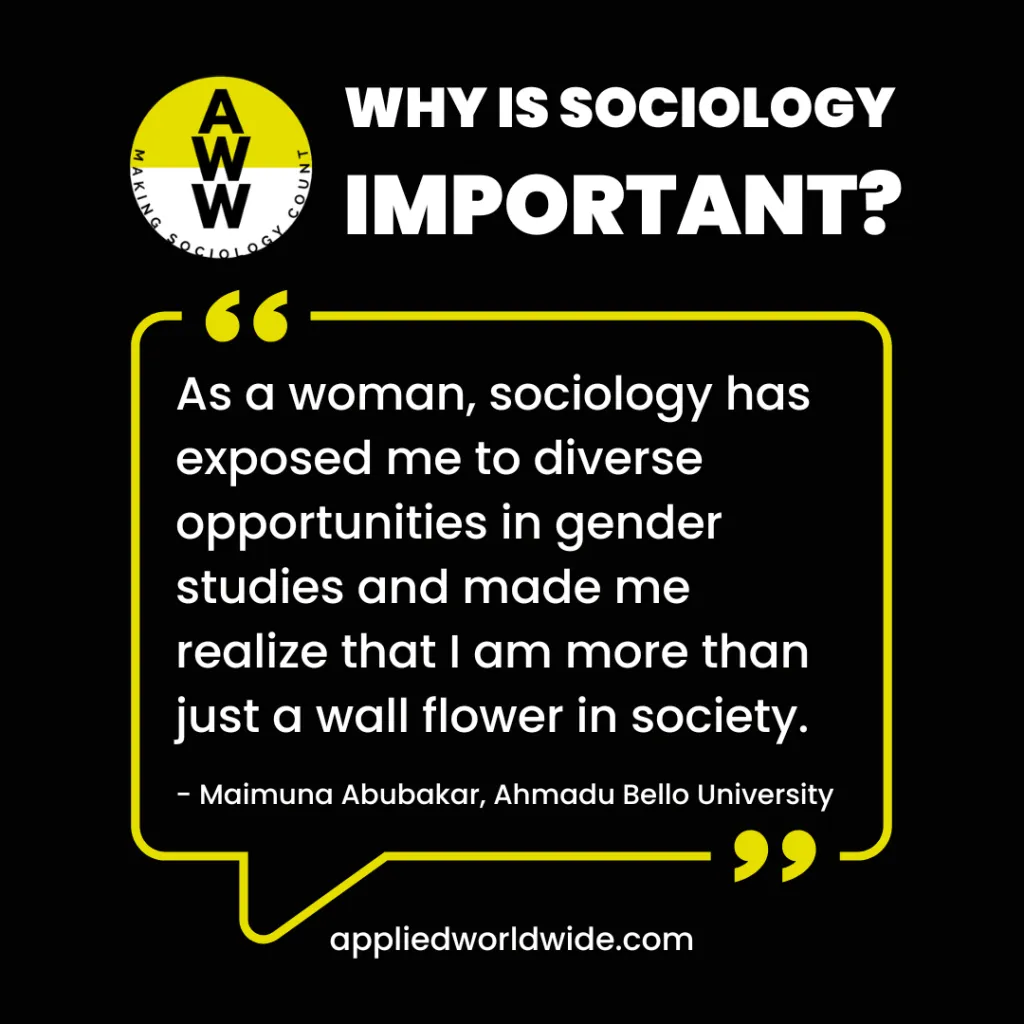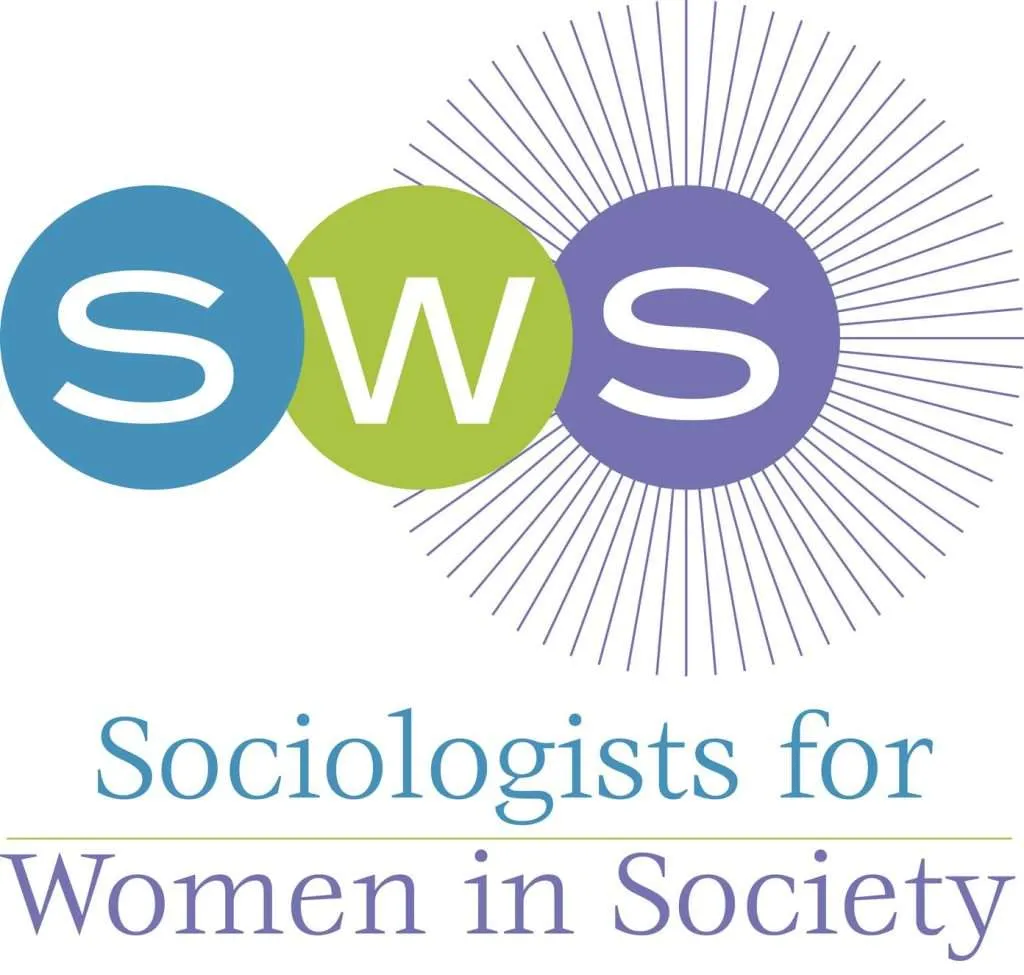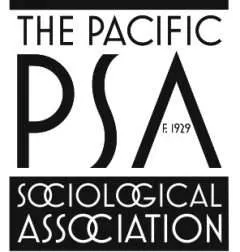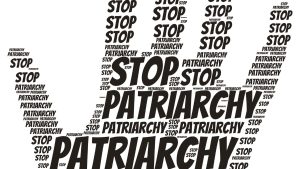Editorial Note
Thank you to our generous sponsors, Sociologists for Women in Society, Center for Equity Education, American Sociological Association’s Section on Sociological Practice & Public Sociology, Hartman Castle Preservation Corporation, Island Acres Resort Motel, Alpha Kappa Delta, Pacific Sociological Association, and the Association for Applied & Clinical Sociology for helping us make Applied Worldwide’s 2024 “Why is Sociology Important?” student essay competition a success!
This essay on the importance of sociology has been published on behalf of Applied Worldwide’s 2024 Global Student Essay Competition. For the 2024 competition, we awarded 16 student essayists across six countries and will be sharing each winning essay in our “Why is Sociology Important?” essay collection.
This sociology essay was written by Maimuna Abubakar, a fourth year sociology student from Ahmadu Bello University, Zaria, Nigeria and earned a 3rd place prize in the competition.
Sociology: A Lens for a Cosmopolitan World, Maimuna Abubakar
Shortly after I graduated from secondary school, I enrolled in an A-level program which is often—but not always—for those who are unable to secure admission into the university and have to wait a year. It was the first time I came in contact with the course sociology. One of the lecturers at the program took us a class on introduction to sociology and I was awestruck at how well versed he was in several areas that I developed an interest in the study of sociology instantly. He took us through the evolution of society from different viewpoints, to the arguments about the factors that are contributing to the persistent underdevelopment of the African continent where we discussed Walter Rodney’s “How Europe Underdeveloped Africa,” the pervasive inequality within the society, the subjugation of women, the inherent social stratification and inequality in our immediate society, social mobility and how it depends on one’s ascribed or achieved status, the influence of religion, family, and cultural values on our behaviors and interpretation of social reality.
When I told my parents about my decision to major in sociology at the university, they were unanimously against it. The first question they asked was where do sociologists work? When you graduate, what do you become? Typical of Nigerian parents, when you are not studying medicine, law, or engineering, then you don’t have a bright future.
Also, as a girl coming from a society that has traditionally indoctrinated girls to believe that a woman’s only place is in her home and nowhere within the larger society, my decision faced a lot of resistance from immediate family members and relatives who assumed that I am going to lose myself, my religious values and identity once I major in sociology because according to them,“sociologists do not not believe in the existence of God.”
Against all odds, I applied sociology and gained admission and these are some of the reasons why I think sociology is important:
Sociology is important because it delves into the various intricate aspects of human interaction such as the Social Evolution of Man. Different sociological scholars provided various insights on their understanding of how human thoughts evolved. Auguste Comte, one of the classical contributors in the discipline of sociology postulated in his work on the Law of Three Stages that an individual develop from the stage of a devout believer, to a critical metaphysician who question the abstract notion of existence, to a natural philosopher or a scientist. He called the first stage theological or fictitious stage where “all theoretical concepts whether general or specific bear a supernatural impress.” In this stage, people are unaware of the causes of natural and social phenomena and therefore attributed all happenings to an imaginary or divine forces beyond their mental reach. The second stage is the metaphysical or abstract stage where rationalism overtook imagination. Metaphysical thought helped man to discard the belief in divine beings while reasoning helped man to find some order in the natural world. The final stage is the positive or scientific stage where the observation and classification of facts marks its beginning.
Comte illustration of these stages is still obtainable here in Nigeria in most rural communities and even among conservative urban dwellers who associate natural and social events to certain divinity or supernatural power. For instance, my cousin fell ill after the family visited our grandmother living in the village, their first assumption was that someone at the village might have cursed the child, later they began to reason that it may have been that the child is exposed to an environment he was unfamiliar with which may have caused the illness, or he may have eaten something that upsets his stomach, finally when the child was taken to the hospital, it was confirmed that the child had food poisoning and an allergy. In the same vein, Nigeria is plagued with different social vices and economic depression but the majority of Nigerians are attributing these challenges to mean that it is God’s way of punishing the Nigerian citizens for all of our transgressions. Looking at these scenario help me to understand that some people are still at the fictive stage in their mental evolution, others are at the abstract stage while few are at the positivist stage, more so, a lot of people in Nigeria are interchangeably within these stages depending on situations.
I also find sociology very important because of its robust subfields and how each explore specific social reality. For example, when I took a course on the sociology of crime and deviant behaviors, it exposes me to why people commit crimes or engage in activities that are regarded as deviance, how some behaviors are labeled as deviance by certain people or community while same behaviors are not seen as such by other people or community, this is often as a result of the relativity of deviance to either time, place, person, or type. For example in my community in Niger State, it is against the value of the society for a girl to expose her body in anyway such as her thighs or cleavages, such display is frowned upon by the society and seen as deviating from the standard norms with which the society operates, however, in Lagos State, such modes of dressings are not considered deviance by the majority of the people.
Sociology of aging, also known as social gerontology, is another subfield whose relevance cannot be overemphasized. Often people don’t pay attention to the psychological changes of their elderly, they either translate all of their actions as them just being old or even fail to recognize the impact of this changes on their mental wellbeing; how someone who has been independent all their lives will suddenly have to depend on others for even simple, basic and mundane things like using the restroom, or how sometimes they don’t even need our help but we may assume that they do simply because they are old. My mother died at the age of 70 and until her death, what she hated the most about old age was her inability to do simple things for herself, how she can no longer visit her neighbors without assistance or make her own food. Because I had already learn social gerontology, I was able to understand her even when my siblings, aunts and uncles don’t. Whenever she insisted on helping in food preparation, I allowed her to do whatever she feels she can do just so she doesn’t think that she is now useless because she is old.I may have never learnt this if I wasn’t a sociology major.
Sociology is also very significant because it challenges us not to accept anything based on its face value but to question everything and try to confirm facts before accepting it. As a sociology major, I am trained not to become a blind follower or to judge people based on mere assumptions, rather to confirm information through proper investigation and to try as much as I can to remain objective in my research. For instance, just because majority of the people arrested for armed banditry especially in the northern region of Nigeria are often Fulani herdsmen does not mean that all Fulani people should be blamed or discriminated against.
Sociology is important as it teaches us to have respect for people’s values, cultures and customs. To never underrate other peoples way of life simply because it does not correspond with ours or because it is not the same as how we have been used to. To do that will be ethnocentric and a disregard for cultural relativism.
As a woman, sociology has exposed me to diverse opportunities in gender studies and made me realize that I am more than just a wall flower in the society. That I can contribute intellectually and socially to the betterment of the society. That despite the unequal treatment between the male and the female that has been perpetuated in the society, I can change the narrative, I can be whoever I want to be and my biological makeup is not a hindrance.

In my first year as a Sociology major, we were introduced to the contributions of the founding fathers such as Auguste Comte, Karl Marx, Max Weber, Herbert Spencer, Emile Durkheim among others. It baffled me that there was no mention of a female Sociology contributor, when I asked my seniors, I was told that female sociologists were not seen as relevant and so discussion about female contributors to Sociology is not part of our course content. I decided then to learn about female sociologists on my own where I discovered the incredible contributions of amazing women like Harriet Martineau who wrote about society and social conditions even before Weber, Durkheim and Marx!
Harriet Martineau wrote about the patriarchal condition of women in the 19th century and contributed in discussion on religion, social and political institutions in the society. Martineau’s most notable contribution was the translation of Comte’s ‘ The Positive Philosophy (1853); Jane Addams helped developed the Settlement House Movement in the United States and drastically influenced American Sociology, education, labour and social work; Marianne Weber was a German sociologist and a women’s rights activist; Beatrice Webb was an English sociologist, an economist, labor historian and a social reformer; and many others like Stacy Judith, Nancy Chodorow, Catriona Mirrlees-Black. The contribution of these amazing women is an inspiration to me and it shows me how important sociology is in social development.
Final Thoughts on the Importance of Sociology
Sociological knowledge and understanding is very crucial as it is applicable across all disciplines from industrial relations, urbanization studies, public health and illnesses behavior, social change and globalization, environmental sustainability studies, climate change and its impact on human lives and livelihoods, group dynamics and group behaviors, to mention but few. Sociology is without doubt a lens through which our cosmopolitan world can be viewed.
Meet our 2023 Global Student Essay Competition Sponsors!

Sociologists for Women in Society is a nonprofit professional feminist organization dedicated to:
- Transforming the academy and professional organizations, including our own, by actively supporting feminist leadership and advancing career development of feminist scholars.
- Recognizing that structural inequalities impact those marginalized by their identities and that this requires proactively promoting the creation of inclusive institutional spaces in an ongoing manner and by practicing critical reflexivity.
- Advocating and encouraging the development of sociological feminist theory rooted in intersectionality and cutting-edge research for publication and dissemination.
- Promoting social justice research within local, national, and international activist spaces by supporting scholar-activist communities seeking to dismantle intersecting systems of oppression.

The Center for Equity Education (CFEE), established in 2020 as a 501(c)(3) nonprofit, addresses a gap in expert-led education for organizations, especially those with limited resources. At CFEE, our mission revolves around empowering organizations with comprehensive knowledge on federal and state civil rights, specializing in harassment and discrimination, including sexual harassment.

Hartman Castle Preservation Corporation, a 501c3 non-profit, is a A community grassroots movement formed to purchase and preserve the Hartman Castle in Gunnison, CO

The purpose of the American Sociological Association’s Section on Sociological Practice and Public Sociology is to advance sociologically-informed research and practice, to further public discussion of sociological issues, and to promote the use of sociology to inform public policy.

Island Acres Resort Motel is a restored authentic 1950s lodging property in the style of the tourist court motel. Embracing the appeal of a bygone era, where history blends with hospitality.

Alpha Kappa Delta, the International Sociology Honor Society, seeks to acknowledge and promote excellence in the scholarship in the study of social problems, sociology, and intellectual activities that lead to the improvement in the human condition.

The Pacific Sociological Association is committed to serving sociologists, faculty, applied professionals, and students. We strive to create a professional community that reflects the diversity of our region and enhances the diversity of our discipline. We are committed to inclusivity and equity in our organization, to promoting social justice by examining and challenging the structural and institutional barriers in our discipline, and to building pathways for the next generation of sociologists.

The Association for Applied and Clinical Sociology (AACS) promotes applying social scientific knowledge and methods to develop constructive solutions. We provide educational, programmatic, mentoring, networking, and policy resources in a supportive professional community.







